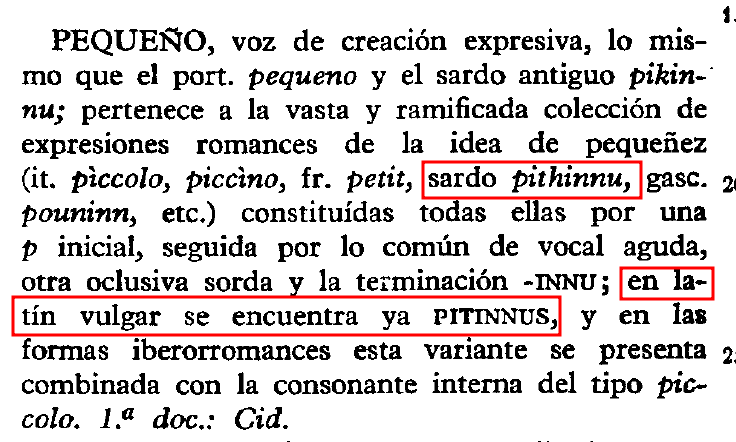Being interested in the obscure etymology of popular Romanian word "pitic" (n.m. "dwarf", adj. "of small stature") I have oddly concentrated only on a possible Greek-Slavic connection and have posted this question: Is the ancient word Greek πῐ́θηκος / píthēkos ("monkey") attested with the meaning "dwarf" more than once?, while omitting maybe the most important part of that Wictionary page which links to Vulgar Latin pitikkus (“small”), Sardinian pitticcu (“small”) and Basque pitika (“kid”). (See the links at the page linked above, I am not adding the three links here directly because they are not useful: the first two lead to yet absent pages, the Basque one leads to a Swahili word.)
So, my question is obvious and plain: is there an attestation in Vulgar Latin (or in Latin for that matter) of a word like pittikus?
In Corominas, J. & Pascual, J.A, Diccionario crítico etimológico castellano e hispánico, Editorial Gredos, Madrid, 1987, the Castilian pequeño is considered an expressive form but related to a lot of other Romance words like French petit, Italian piccolo, piccino, Sardinian pithinnu, Gascon pounnin, but also the Vulgar Latin pitinnus.
Could it be that Wiktionary is simply misspelling the Latin and Sardinian words?
Corominas notes that the Iberian forms are a transformation of the Latin form with an internal consonant like in Italian piccolo, which means that within the structure p + t + n the internal consonant t/th is replaced by c/q/k. That is not the case in Sardinian, which keeps the Latin consonants p + t/th + n.
The symmetrical variation where the other internal consonant is replaced by c, thus providing the formula for the Romanian word pitic, p + t, is present in the French petit.
It is worth noticing that Romanian has a p + c variant too, "pici"=small boy, maybe related to Albanian picërr adj. "tiny, small", picërrak "small/frail kid", picë "small girl" as well as the Italian and other forms. That all this family or words are probably based on an expressive (onomatopoetic) form is probably reflected in Romanian by the expression pic-pic which imitates the falling of water drops, while un pic means "a bit", "very small quantity", the verb a pica means to fall in small drops of liquid, and picătură is the result of that, a drop of liquid (picături de ploaie= rain drops). (But it seems that at the same time pic can be related to a longer etymology.)
In fact, if Vulgar Latin pitinnus is well attested, the Wiktionary page is probably just making a confusion or a misspelling, given it doesn't mention pitinnus at all in this form, which means they do mention it but write it wrongly, just like the Sardinian form.
